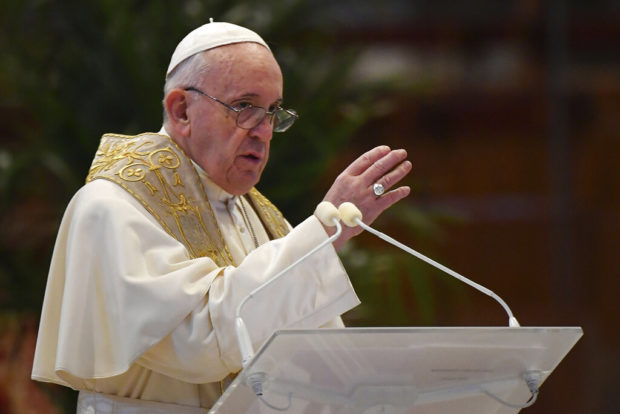‘This is not a time for division,’ Pope Francis says in Easter message

Pope Francis delivers his blessing during Easter Sunday Mass inside an empty St. Peter’s Basilica, at the Vatican, Sunday, April 12, 2020. Pope Francis and Christians around the world marked a solitary Easter Sunday, forced to celebrate the most joyful day in the liturgical calendar amid the sorrowful reminders of the devastation wrought by the coronavirus pandemic. The new coronavirus causes mild or moderate symptoms for most people, but for some, especially older adults and people with existing health problems, it can cause more severe illness or death. (Andreas Solaro/Pool Photo via AP)
VATICAN CITY—Pope Francis broke with centuries of tradition to livestream Easter Sunday Mass to those suffering in the solitude of a coronavirus lockdown that forced the world’s Catholics to improvise on their holiest day.
The 83-year-old Pontiff spoke to the world’s 1.3 billion Catholics from a hauntingly empty Saint Peter’s Basilica at a ceremony attended by just a handful of priests and a small choir that was spaced out across the marble floor.
The pandemic raging outside the Vatican’s locked gates has killed more than 109,000 people and left billions confined to their homes.
The Pope’s traditional Easter Urbi et Orbi (to the city and to the world) message was livestreamed for the first time—a bow to technology in the face of a new illness that has changed the shape of society and altered the way religion is observed.
Easter of solitude
“For many, this is an Easter of solitude lived amid the sorrow and hardship that the pandemic is causing, from physical suffering to economic difficulties,” the Pope said quietly.
A handful of priests and a few faithful also gathered at the Church of the Holy Sepulcher in Jerusalem’s Old City—locked down like the Vatican—to say prayers at the spot where Christians believe Jesus was crucified and resurrected on Easter.
The Pope urged the world’s leaders to put aside their political fights and call back their armies during a global health emergency of a magnitude not seen in 100 years.
“This is not a time for division,” Francis said. “May Christ enlighten all who have responsibility in conflicts, that they may have the courage to support the appeal for an immediate global ceasefire in all corners of the world.”
He said health considerations required world powers to ease crippling economic sanctions imposed against their adversaries—a possible reference to those weighing over pandemic-hit Iran.
“In light of the present circumstances, may international sanctions be relaxed, since these make it difficult for countries on which they have been imposed to provide adequate support to their citizens,” Francis said.
He called for a “reduction, if not the forgiveness, of the debt burdening the balance sheets of the poorest nations” and for European nations to show the same “solidarity” they did in the wake of World War II.
“After the Second World War, this beloved continent was able to rise again,” he said. “The European Union is presently facing an epochal challenge on which will depend not only its future but that of the whole world.”
Religious improvisation
The Pope’s virtual Easter Sunday message was just the most vivid example of religious improvisation in the age of social distancing and confinement.
The archbishop of Panama took to the air and blessed his tiny Central American nation from a helicopter. The faithful in Spain blasted religious music from their balconies during Holy Week.
A parish near the Philippines’ capital Manila pasted the empty pews with family photos that the faithful had emailed to the priest.
“Those photos are the representations of the people who are watching and attending Mass through livestreaming, so we also feel their presence virtually,” priest Mark Christopher De Leon said.
The Orthodox Church in Greece is planning to hold Mass behind closed doors for its Easter on April 19.
Jews across the world did their best by using Zoom or other video conferencing apps to “seder-in-place” when the eight-day Passover holiday started on Wednesday evening.
State television in Lebanon broadcast Mass under lockdown from an empty church north of Beirut.
Catholics in neighboring Syria—where celebrations had continued in Christian quarters of Damascus despite years of agonizing war—stayed home this time because of the virus.
Westminster Abbey in London is following the technological trend by releasing Easter podcasts for the faithful of the Anglican Church.
And priests at France’s Roman Catholic shrine in the southwestern town of Lourdes were relaying nine consecutive days of prayers on Sunday by Facebook Live and YouTube.
In Colombo, Cardinal Malcolm Ranjith told a Mass broadcast live that Sri Lanka’s Roman Catholic Church had forgiven suicide bombers behind attacks that killed at least 279 people last Easter.
“We offered love to the enemies who tried to destroy us,” he said.
‘Saints next door’
Francis cut a lonely, but striking figure when he slowly entered a starkly empty Vatican square for a torch-lit Good Friday procession.
In previous years, he had observed Holy Thursday service marking Christ’s Last Supper by washing the feet of 12 inmates on the outskirts of Rome.
The virus made this impossible.
Francis instead said a prayer for the dozens of priests and health workers who have died across Italy while attending to the sick.
“They are the saints next door, the priests who gave their lives by serving,” Francis said.
He invited five nurses and doctors to accompany him for the Good Friday processions in order to highlight their profession’s sacrifices over the past month.
Francis himself has reportedly been tested twice for COVID-19 since coming down with a cold at the end of February.
He told the Catholic newspapers that people across the world could try to spiritually escape their confinement through introspection.
“So: to be in lockdown, but yearning, with that memory that yearns and begets hope,” the Pope said.”This is what will help us escape our confinement.”